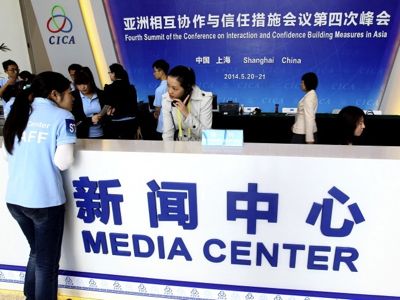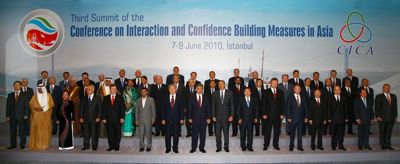
Während die NATO in Brüssel ihre 28 Verteidigungsminister einberuft, um ihre Truppen in einer anti-russischen Funktion zu stärken, indem sie auch die Ausbildung des Militärs und des Paramilitärs von Kiew intensiviert (einschließlich der bewaffneten Banden, die versuchten, den Sekretär der kommunistischen Partei der Ukraine zu töten), und während die Europäische Union Sanktionen gegen Russland ergreift, kommt die Antwort nicht aus Moskau, sondern aus dem entfernten Peking.
Präsident Putin beginnt heute seinen offiziellen Besuch in China, während dem etwa 30 bilaterale Abkommen unterzeichnet werden, dessen erster Effekt sein wird, den Washington-Plan zu Nichte zu machen, der darauf abzielt, „Putins Russland zu isolieren, indem man seine wirtschaftlichen und politischen Beziehungen mit der Außenwelt abschneidet“.
Die Tragweite der Vereinbarungen ist von strategischer Bedeutung. Ein Vertrag von einem Wert von $ 270 Milliarden zwischen dem russischen Staatsunternehmen Rosneft und Chinas National Petroleum Company sieht vor, dass Russland in den nächsten 25 Jahren mehr als 700 Millionen Tonnen Öl China zur Verfügung stellt. Ein anderer Vertrag sieht vor, dass das staatliche russische Unternehmen Gazprom China 38 Milliarden Kubikmeter Gas pro Jahr bis 2018 liefern wird, d.h. etwa ein Viertel von dem, das es heute an Europa liefert. Auch mit chinesischen Investitionen von $ 20 Milliarden plant Moskau die Pipeline von Ost-Sibirien bis zum Pazifik zu ermöglichen, und flankiert sie mit einer 4000 km langen Gasrohrleitung um China zu beliefern. Peking ist auch an Investitionen auf der Krim interessiert, insbesondere für die Herstellung und den Export von verflüssigtem Erdgas, für die Modernisierung der Landwirtschaft und den Bau eines Kornterminals. Zur gleichen Zeit spielen Moskau und Peking mit dem Gedanken, den Dollar als Währung für den Handel im asiatischen Raum aufzugeben. Und die Russische Föderation ist jetzt dabei, ihr eigenes Zahlungssystem nach dem Vorbild der chinesischen Union Pay voran zu treiben, deren Kreditkarten in mehr als 140 Ländern weltweit verwendet werden können, dem zweitgrößten System nach der Visa-Karte.
Die russisch-chinesische Zusammenarbeit beschränkt sich nicht auf wirtschaftliches Gebiet allein. Diplomatischen Quellen zufolge werden die Präsidenten Xi Jinping und Wladimir Putin eine "inhaltsreiche Erklärung" über die internationale Lage abgeben. Die Konvergenz der strategischen Interessen wird durch das gemeinsame Manöver veranschaulicht werden, das die Flotten der beiden Länder im Südchinesischen Meer gerade nach dem großen US- Marine Manöver auf den Philippinen machen werden. Eine militärische Vereinbarung ist praktisch abgeschlossen: im Rahmen dieser Vereinbarung wird Moskau Peking Suchoi Su-35 All Zweck Jäger, U-Boote der Lada-Klasse und die modernsten S-400 Raketen-Verteidigungs-systeme liefern.

- Die Konferenz auf Interaktion-Maßnahmen und Vertrauensbildung in Asien (CICA) wurde 2006 auf Initiative vom Kasachstan gegründet und hat sein ständiges Sekretariat in Almaty. Die rotierende Präsidentschaft wird für die Eröffnung des nächsten Gipfels von Schanghai am 21. und 22. Mai 2014 von der Türkei an China überreicht.
Um die Konvergenz der Interessen zwischen Moskau und Peking zu unterstreichen, spricht Putin auf der Konferenz über Maßnahmen zur Interaktion und Vertrauensbildung in Asien (CICA), unter dem Vorsitz von Xi Jinping, in Shanghai am 21. und 22. Mai, Konferenz, an der insbesondere der irakische Ministerpräsident Nouri al-Maliki, der afghanische Präsident Hamid Karzai, und der iranische Hassan Rohani teilnehmen. Ein Schlag für die Vereinigten Staaten, die in den Kriegen im Irak und in Afghanistan 6 000 Milliarden Dollar verpulvert haben, jetzt aber China in diesen Ländern wirtschaftlich immer aktiver sehen. China kauft in Irak rund die Hälfte der Ölproduktion des Landes und macht große Investitionen in der Ölindustrie; in Afghanistan investiert es vor allem im Bergbau, nachdem die Pentagon-Geologen reiche Vorkommen von Lithium, Kobalt, Gold und anderen Metallen entdeckt hatten. Und da Russland und China dem Iran die östlichen Märkte geöffnet haben, machen sie in der Tat das Embargo der USA und der EU praktisch zu Nichte.
An der Westfront sind die Dinge für Washington nicht besser. Die von der Obama-Administration erwähnte Möglichkeit, die russischen Gaslieferungen nach Europa um mehr als 25 % in einem Jahrzehnt zu verringern, und sie durch verflüssigtes Erdgas aus den USA zu ersetzen, erweist sich allmählich als reiner Bluff. Was diese Tatsache bestätigt, ist, dass trotz der angekündigten Sanktionen von Berlin, die deutschen Unternehmen weiterhin in die russische Energiewirtschaft investieren: das RMA Pipeline Equipment Kehl, Hersteller von Ventilen für Öl- und Gaspipelines eröffnet gerade seinen größten Standort an der Wolga. Und Gazprom hat alle Verträge bereits unterzeichnet, darunter einen von 2 Milliarden Euro mit der italienischen Firma Saipem (Eni), für den Bau der South Stream-Pipeline, die unter Umgehung der Ukraine das russisches Gas durch das Schwarze Meer nach Bulgarien, und von dort, in die EU bringt. Selbst wenn es den Vereinigten Staaten gelingen sollte den South-Stream zu blockieren, könnte Russland sein Gas nach China umlenken.
Der „East-Stream“ ist von jetzt ab offen.



Western Reset of Fascist Aggression Towards Russia
http://www.strategic-culture.org/news/2014/05/10/western-reset-of-fascist-aggression-towards-russia.html
Bente
Clear ! Makes all sense now... The way Finian Cunningham patiently takes us through time step by step. I was born during WW2 ... some things I knew BUT many I did not know... and I did not have the step by step as there were holes in my knowledge. Russia will be in full knowledge of this at least the people who are in power, and the people who are old enough. The whole 'thing' is horrendous... horrendous also because the US/UK Axis has fooled Europe for so long and still is... however.... today the world looks different and Russia is now sitting with a weapon that was "made" in the West... West needs hydrocarbons, like the dessert needs water, Russia has them, AND Russia and China today has something neither EU or US has - MARKETS - AND EVEN MORE IMPORTANT THEY HAVE THE WILL TO WINN AND THEIR ARMIES HAVE A PURPOSE TO DEFEND THEIR FATHERLAND - EU's AND US's CAPITALIST/ FASCIST GOVERNMENTS DO NOT HAVE THAT. EU and US are weak, tired, sick, infected by a deadly virus: GREED, a greed that know no limits, that eats them up from inside. They are almost gone.
BrunoPaul
An additional reference:
'How Bush's grandfather helped Hitler's rise to power'
http://www.theguardian.com/world/2004/sep/25/usa.secondworldwar
I wrote too about the use of fascism into the western political game in this recent article (in french): http://conscience-sociale.blogspot.fr/2014/05/combler-le-vide-politique-elections.html